Review: Ecobee4 Thermostat a strong choice for Apple HomeKit & Amazon Alexa users
The ecobee4 is easily one of the best smart thermostats you can buy, the only questions being compatibility with your house and whether you can justify its hefty price tag.
For me, at least, the concept of a smart thermostat has had a strange appeal since the launch of the first-generation Nest. It may be because my body heat is out of control -- I'm the lunatic who opens the window when it's still jacket weather outside. But I also enjoy gadgets that can save you money, and just the concept of home automation delivering pure comfort when I want it.
Nest is often the go-to choice for thermostats, but rumors aside, its HomeKit support has been on the backburner. The company is owned by Google, after all.
There are actually a number of HomeKit thermostats on the market at this point, including ones from long-established brands like Carrier and Honeywell. Ecobee has only been around since 2007, and the company didn't gain much traction until the ecobee3, which picked up HomeKit support in 2015.
On a basic level, the ecobee4 does what any smart thermostat should. It circumvents the convoluted scheduling of regular thermostats, allows remote access via apps and/or the Web, and promises energy bill savings through better efficiency as well as being able to tell whether or not you're home.
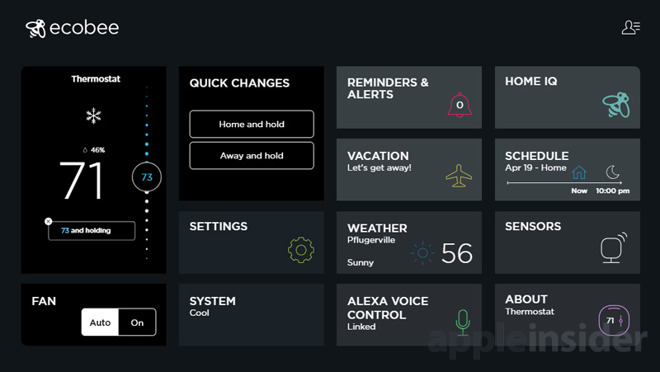
The Ecobee Web interface.
Rather than being a "learning" product like the Nest, Ecobee's party trick is the use of separate room sensors (one comes bundled) on top of the one in the thermostat. This gives it a better overall climate picture, which may be handy if your existing thermostat is in a place that doesn't reflect the temperature of a house/floor as a whole.
The ecobee4 has another trick -- a built-in Alexa speaker -- but we'll return to that shortly.
Some people like myself are going to run into extra complications by the nature of their heating and cooling systems. We discovered the hard way that our test house uses a heat pump -- until we found an article on Ecobee's website explaining how to fix the problem, temperatures soared to 85 Fahrenheit as our HVAC system blasted heat instead of cooling. It's critical to know what equipment your house has before attempting a self-install, or even buying the ecobee4 in the first place, since some homes may not be compatible. It does however support a wide range, and Ecobee's website teaches you how to check.
Once hardware is in place you'll have to use the Ecobee app to sign up for an account and link the accessory to HomeKit and/or your Amazon account. You can't just use the iOS Home app, as the HomeKit pairing code must be triggered on-screen.
We'd also highly recommend hooking the ecobee4 into IFTTT, a third-party automation service, since it can add further functionality such as weekly activity logs or notifications for status changes.
Some of the menus provide an absurd amount of control over how your HVAC behaves, such as how hard AC overcooling will kick in to dehumidify, and the minimum runtime for fans. In fact a mildly frustrating problem is that some of these options can only be controlled from the thermostat, not the iOS app.
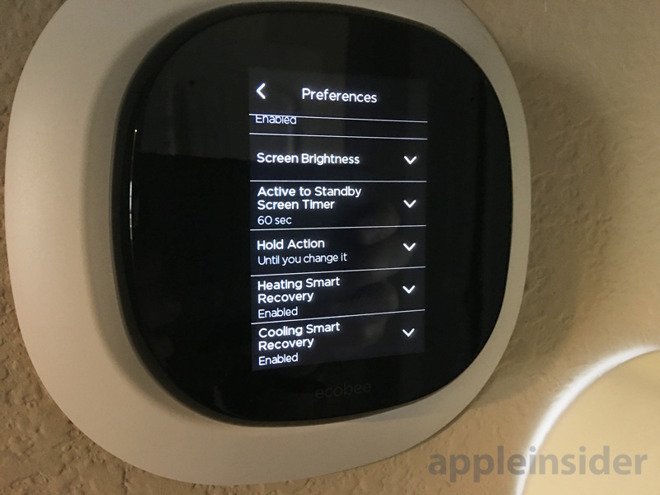
The app, Web interface, and touchscreen let you set up daily schedules categorized by customized "Home," "Away," and "Sleep" profiles. It's easy to copy one day's schedule to the rest of the week, and you can always override plans through Home and Away shortcuts, or by manually changing the temperature.
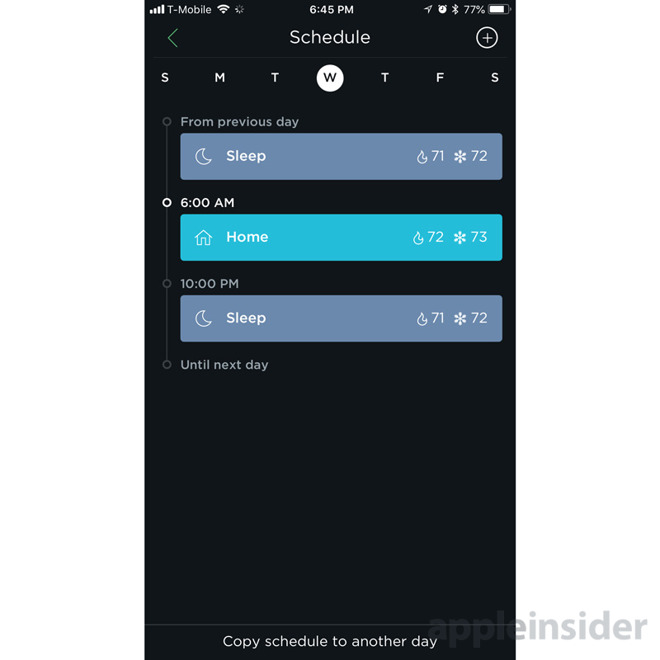
If you have a fairly predictable routine you may almost never need to bother touching the ecobee4 after that, except for days off work or going on vacation. You can schedule vacation time in advance so that the thermostat eases off until you return.
Convenience is increased if you have a bunch of Echos around the house. Imagine being trapped in a cold bed, for example, but being able to heat the room without getting up.
Most general Alexa commands are supported too, so you can look up facts, hear news, and control other smarthome products. There are some unfortunate limits -- our ecobee4 would only play samples of Spotify tracks despite a Premium account, and you can't incorporate the device into automated Routines.
It's worth noting that Ecobee recently fixed the lack of Echo Spatial Perception that caused trouble for early ecobee4 buyers. The feature prevents multiple Alexa-enabled speakers from responding to the same command, instead preferring the one closest to your voice. The absence of ESP would have caused chaos in our test house, which has four Alexa devices without adding a thermostat into the mix.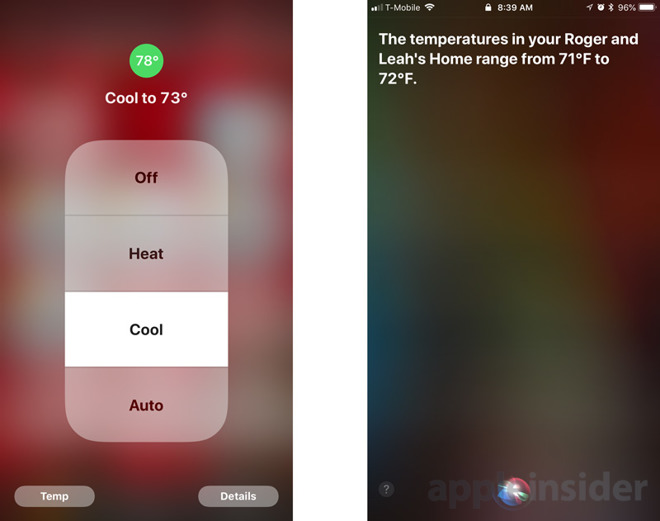
Once you've got HomeKit up and running, you can use Siri commands to make many of the same thermostat adjustments possible with Alexa. The main difference, of course, is that you have to talk to something like an iPhone or HomePod.
By default the Ecobee app adds your Home, Away, and Sleep settings to five HomeKit scenes: "Good morning," "Good night," "I'm home," "I'm leaving," and "Resume Schedule." The last one is witchcraft, in that I'm not sure how HomeKit allows it, but can nevertheless be handy since you may lose of some of the efficiency advantages of an Ecobee if you rely exclusively on Siri commands and HomeKit scenes.
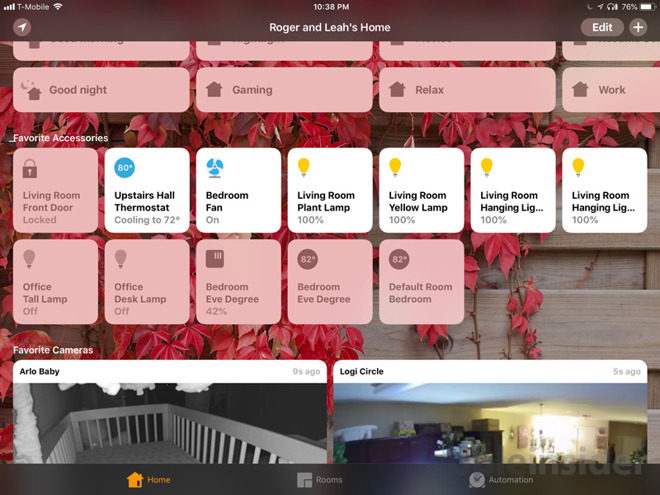
Scene integration can be quite useful, and arguably one of the main reasons an iPhone owner might pick Ecobee over Nest. With appropriate accessories and tweaks the "I'm home" scene might not just turn down the temperature but unlock your door, turn on the lights, and start a pot of coffee brewing -- all triggered by geofencing or a Siri request.
Oddly enough, you can't create temperature-conditional scenes or automations. I had been hoping to build a scene that would turn on the bedroom fan if the thermostat detects high heat, but that seems to be out of the question.
The sensors can sometimes be slow to change state, too. Our test system was limited to the top floor of the house, but in one early case the Ecobee app registered the space as "occupied" well after everyone went downstairs. In the end we simply left Follow Me and Smart Home/Away deactivated.
Should you invest in an ecobee4? Possibly, if you're eager to get started on a HomeKit- or Alexa-enabled house and/or prepared to leave it installed for several years to recoup your money. Ecobee promises up to 23 percent in savings on your HVAC costs, but that can fluctuate based on weather, preferred settings, and power company rates. Buy for smarthome conveniences first and foremost.
If you don't care about Alexa or external sensors you could even choose the $169 ecobee3 lite, which is little different from the 4. It's still HomeKit- and Alexa-enabled, and you can buy an Echo Dot and a two-pack of room sensors later if you want.
For me, at least, the concept of a smart thermostat has had a strange appeal since the launch of the first-generation Nest. It may be because my body heat is out of control -- I'm the lunatic who opens the window when it's still jacket weather outside. But I also enjoy gadgets that can save you money, and just the concept of home automation delivering pure comfort when I want it.
Nest is often the go-to choice for thermostats, but rumors aside, its HomeKit support has been on the backburner. The company is owned by Google, after all.
There are actually a number of HomeKit thermostats on the market at this point, including ones from long-established brands like Carrier and Honeywell. Ecobee has only been around since 2007, and the company didn't gain much traction until the ecobee3, which picked up HomeKit support in 2015.
On a basic level, the ecobee4 does what any smart thermostat should. It circumvents the convoluted scheduling of regular thermostats, allows remote access via apps and/or the Web, and promises energy bill savings through better efficiency as well as being able to tell whether or not you're home.

The Ecobee Web interface.
Rather than being a "learning" product like the Nest, Ecobee's party trick is the use of separate room sensors (one comes bundled) on top of the one in the thermostat. This gives it a better overall climate picture, which may be handy if your existing thermostat is in a place that doesn't reflect the temperature of a house/floor as a whole.
The ecobee4 has another trick -- a built-in Alexa speaker -- but we'll return to that shortly.
Installation and setup
Installation is more complex than your average HomeKit accessory. Theoretically it can be done in as little as 30 minutes, but realistically, expect to spend longer. Ecobee's software and support make the experience as painless as possible, but even in an ideal scenario there's still drilling, rewiring, and configuring settings and services just the way you like them.Some people like myself are going to run into extra complications by the nature of their heating and cooling systems. We discovered the hard way that our test house uses a heat pump -- until we found an article on Ecobee's website explaining how to fix the problem, temperatures soared to 85 Fahrenheit as our HVAC system blasted heat instead of cooling. It's critical to know what equipment your house has before attempting a self-install, or even buying the ecobee4 in the first place, since some homes may not be compatible. It does however support a wide range, and Ecobee's website teaches you how to check.
Once hardware is in place you'll have to use the Ecobee app to sign up for an account and link the accessory to HomeKit and/or your Amazon account. You can't just use the iOS Home app, as the HomeKit pairing code must be triggered on-screen.
We'd also highly recommend hooking the ecobee4 into IFTTT, a third-party automation service, since it can add further functionality such as weekly activity logs or notifications for status changes.
Basic use
The device itself sports a small color touchscreen. From a distance this shows the time, the current indoor temperature, and a snapshot of outdoor weather. Approach it and the interface morphs to present a control slider, settings menus, and an option for a more detailed weather forecast, including humidity.Some of the menus provide an absurd amount of control over how your HVAC behaves, such as how hard AC overcooling will kick in to dehumidify, and the minimum runtime for fans. In fact a mildly frustrating problem is that some of these options can only be controlled from the thermostat, not the iOS app.

The app, Web interface, and touchscreen let you set up daily schedules categorized by customized "Home," "Away," and "Sleep" profiles. It's easy to copy one day's schedule to the rest of the week, and you can always override plans through Home and Away shortcuts, or by manually changing the temperature.

If you have a fairly predictable routine you may almost never need to bother touching the ecobee4 after that, except for days off work or going on vacation. You can schedule vacation time in advance so that the thermostat eases off until you return.
Alexa
Though some people may be apprehensive about privacy issues, Alexa integration proves to be extremely convenient, especially since you don't need to buy a separate speaker. You can check the temperature, ask to set a specific value, raise or lower it by a certain amount, and schedule vacation time. You can even use vague comands like "increase the [thermostat] temperature."Convenience is increased if you have a bunch of Echos around the house. Imagine being trapped in a cold bed, for example, but being able to heat the room without getting up.
Most general Alexa commands are supported too, so you can look up facts, hear news, and control other smarthome products. There are some unfortunate limits -- our ecobee4 would only play samples of Spotify tracks despite a Premium account, and you can't incorporate the device into automated Routines.
It's worth noting that Ecobee recently fixed the lack of Echo Spatial Perception that caused trouble for early ecobee4 buyers. The feature prevents multiple Alexa-enabled speakers from responding to the same command, instead preferring the one closest to your voice. The absence of ESP would have caused chaos in our test house, which has four Alexa devices without adding a thermostat into the mix.
HomeKit

Once you've got HomeKit up and running, you can use Siri commands to make many of the same thermostat adjustments possible with Alexa. The main difference, of course, is that you have to talk to something like an iPhone or HomePod.
By default the Ecobee app adds your Home, Away, and Sleep settings to five HomeKit scenes: "Good morning," "Good night," "I'm home," "I'm leaving," and "Resume Schedule." The last one is witchcraft, in that I'm not sure how HomeKit allows it, but can nevertheless be handy since you may lose of some of the efficiency advantages of an Ecobee if you rely exclusively on Siri commands and HomeKit scenes.

Scene integration can be quite useful, and arguably one of the main reasons an iPhone owner might pick Ecobee over Nest. With appropriate accessories and tweaks the "I'm home" scene might not just turn down the temperature but unlock your door, turn on the lights, and start a pot of coffee brewing -- all triggered by geofencing or a Siri request.
Oddly enough, you can't create temperature-conditional scenes or automations. I had been hoping to build a scene that would turn on the bedroom fan if the thermostat detects high heat, but that seems to be out of the question.
Minor flaws
There are a few other problems worth mentioning, but nothing too serious. The ecobee4 offers "Smart Home/Away" and "Follow Me" options which can automatically switch comfort profiles based on your presence, but in a reasonably-sized home you'll probably need to buy extra room sensors to make this accurate.The sensors can sometimes be slow to change state, too. Our test system was limited to the top floor of the house, but in one early case the Ecobee app registered the space as "occupied" well after everyone went downstairs. In the end we simply left Follow Me and Smart Home/Away deactivated.
Cost savings & conclusions
Thanks to our power provider's app, we noticed an almost immediate dip in energy use. Nothing dramatic -- perhaps saving less than $2 worth in the first week -- but that trend seemed to continue in the second week, and could make a real dent in the long run and/or in homes that consume lots of energy.Should you invest in an ecobee4? Possibly, if you're eager to get started on a HomeKit- or Alexa-enabled house and/or prepared to leave it installed for several years to recoup your money. Ecobee promises up to 23 percent in savings on your HVAC costs, but that can fluctuate based on weather, preferred settings, and power company rates. Buy for smarthome conveniences first and foremost.
If you don't care about Alexa or external sensors you could even choose the $169 ecobee3 lite, which is little different from the 4. It's still HomeKit- and Alexa-enabled, and you can buy an Echo Dot and a two-pack of room sensors later if you want.

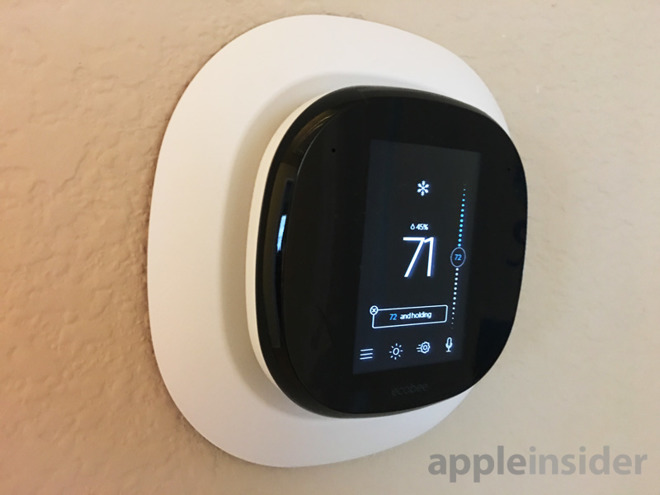
Comments
I only heve one major gripe. Version 6 of their software on an iPad has had so many capabilities STRIPPED out of it. It is a MAJOR STEP BACKWARDS. It has been UNIVERSALLY PANNED by Ecobee users. Whoever at Ecobee decided to remove functionality from a perfectly functioning product should not be allowed to have any further ideas. Just check out the reviews of Version 6 on the App Store.
Shame on Ecobee for not being responsive in putting back what was already in their software!
Again, my Ecobee is in the hallway and so I have to walk up to it to really even use Alexa and at that point I might as well use the touch screen. I think if you want Alexa, that maybe you should just get a Ecobee 3 and than a Echo Dot that you can place anywhere you like. You can control Alexa just the same.
I've found that Siri is easier to use. I can go "Hey Siri, Set temp to 72" and that's it and Siri will set the temp to 72. Using Alexa which in general is a hassle, I have to ask it or tell it to do something and with what and say things just right for it to work. So something like, "Alexa, Tell Ecobee to set temp to 72" I think that will work. I also have a Google Mini and I can do the same with it as with Siri. "Hey Google, Set temp to 72" and it's also smart enough to know what I'm talking about. So I can use any of those 3.
In general, I just leave it alone. I have a Cooling setpoint and Heat setpoint. And they both show on the display at once. My biggest issue? My dad who lives at my house and is retired and home most of the time. He's over every day screwing with the Ecobee. Not letting it do what it needs to do. So it's locked at whatever HOLD temp. Which I don't get as it's generally pretty much the same thing the default is anyway!!! I'm always clearing the hold.
I also had it where just the fan would run a few times for a few minutes every hour circulating the air in my house. Because in the back bedroom which is my computer room, which I don't have a door there, I have a remote sensor in there. Generally that room is cooler than the rest of the house. With just the fan running, it would balance the air in my house and the temp in the back room would go up and match. But then my dad would complain about the cold air blowing on him in the family room where the temp is much warmer. Wondering why the fan was running blowing cool air. Because the house is at temp in front and not in the back and so the heat is not on, just the fan. I have turned that feature off. When he's gone on a trip for a few days, I turn it back on.
In the end, he's paying the power bill. He wants to run the heat and AC far more than I ever would, that's fine by me. Generally when he's gone, I just turn things off, or at least the AC temp higher and the heat temp lower.
As for the preferences, how most of the settings you can't do on the iOS app, just the Ecobee, it makes perfect since. These are settings you would NEVER screw with once it's setup. For example, my FAN wasn't working correctly. I had to change the setting, and now it works how it should. Why would you want that ability in the iOS app? To screw up settings up like this? These are settings you're going to do, while at your Ecobee after you install it, to make sure your system is working correctly while you're there!!! Not some remote location. That could be bad.
There's other settings you would never change like type of place you're in. How many bedrooms. How many stories. How many people, and so on. This data is used not only for how it works, but for the Charts/Graphics you'll start getting after over a month of having it. It'll compare you're usage to similar homes in your area. See how you rank in energy use and savings. This is all part of the Home IQ.
Again, I think for most people, the Ecobee 3 would be the better option. If you really want Alexa, just get a Echo Dot and you can place that anywhere. It would be more useful and overall a better experience. I've found that really, in general you can just leave it alone. You have your 2 set points. You have it set to for day more and night mode. Have those 2 temps different. If there's no one home for hours on end normally, you can have it shut down or in sleep mode and it senses no movement. And turn on when it does. and/or set the times for it do come on and off when you want. Some of the things I just can't do with my Dad home most of the time even though I'm generally gone 11 hours a day.
My EcoBee3 was an abysmal failure, and support was almost non-responsive. The themostat activated with the web browser app, but the phone app refused to activate. Their activation scheme fails in new and interesting ways, and their best advice for sorting out the reason why their thermostat would display the homekit pairing code was for me to erase my homekit home setup in icloud (what? your product won't show the code, so I should erase everyone else's devices? Forget it.)
They're terrible. Good luck to anyone who buys an Ecobee. It may work at the beginning, but at some point, you're gonna need luck.
I do find that you have to be a bit careful with the remote sensors. One time my kids knocked one down behind a bed or cabinet so it was facing an exterior wall (during winter). This caused things to heat up SIGNIFICANTLY.
But now that I'm more careful about their placement, I really can't complain.
I don't think I'd ever want an Ecobee4 though. I really don't want Alexa or anything similar in my home.
The abysmal failure portion of this thermostat is:
a) multi user geofence triggered automations using Home Kit
b) customer service
ive got a handful of these and about about 20 sensors in use, and after 6 months of troubleshooting with ecobee customer service they’ve helped me not one iota. Further, Apple is of no assistance either. I’m simply told their engineers are working on it.
So do not buy this if for example you’d like the a/c off when the last person leaves the house. It simply will not work as advertised.
Next therm upgrade wont be cloud managed. I don’t see the point.
one problem I found was once in a while, Ecobee3 couldn’t connect to the rounter and I had to manually reconfigure the network!
Entergy- my local Electric utility that operates in parts of Texas, Louisiana, Mississippi and Arkansas- has a program where they will supply you with and pay for professional installation of an Ecobee 4 in exchange for permission to monitor the behavior of your home's HVAC system in an anonymous manner. Apparently by aggregating the data from multiple homes, they are better able to manage the production and distribution of electricity. It also allows them to remotely have some level of control during peak cooling season to mitigate peak demand- otherwise, they can bump your thermostat up a bit on peak demand days to help prevent system outages.
This same utility will also pay for professional HVAC company to come in and do a complete system cleaning (via a different, related program) in exchange for the HVAC tech taking a one time series of measurements after the system cleaning- which also yields info concerning the efficiency of your home and the HVAC system. They will pay for this once every two years.
In order to qualify you have to be in a single family home with ducted air conditioning and functioning wifi service.
Not doing an ad for Entergy, but I imagine many local utility companies have similar programs in place. This could save you the cost of buying an Ecobee Thermostat, get you a free system cleaning and help you save money on your electric bill by sharing data with the utility. They also give you an annual $25 credit on your energy bill. The terms of this program allow you to opt out at any time.
So if you are interested in getting a Smart Thermostat, you might check with your local power utility. These programs are not income qualified- you are helping the utility manage it's system more efficiently which improves service and saves money.
I got mine on black friday 2016, installed about a month later. I logged into the web dashboard the other day and according to the savings calculator, it has paid for itself after about 15 months of use.
HeliBum said: you can't use a regular stat at all? that's kinda outrageous.
What happens if the internet connection goes down or electricity goes out?